This post may contain affiliate links. Learn more.
This classic vegetarian stuffing recipe is savory and satisfying. Includes a fabulous vegan variation and an option to include sausage, too. Perfect with turkey or without.
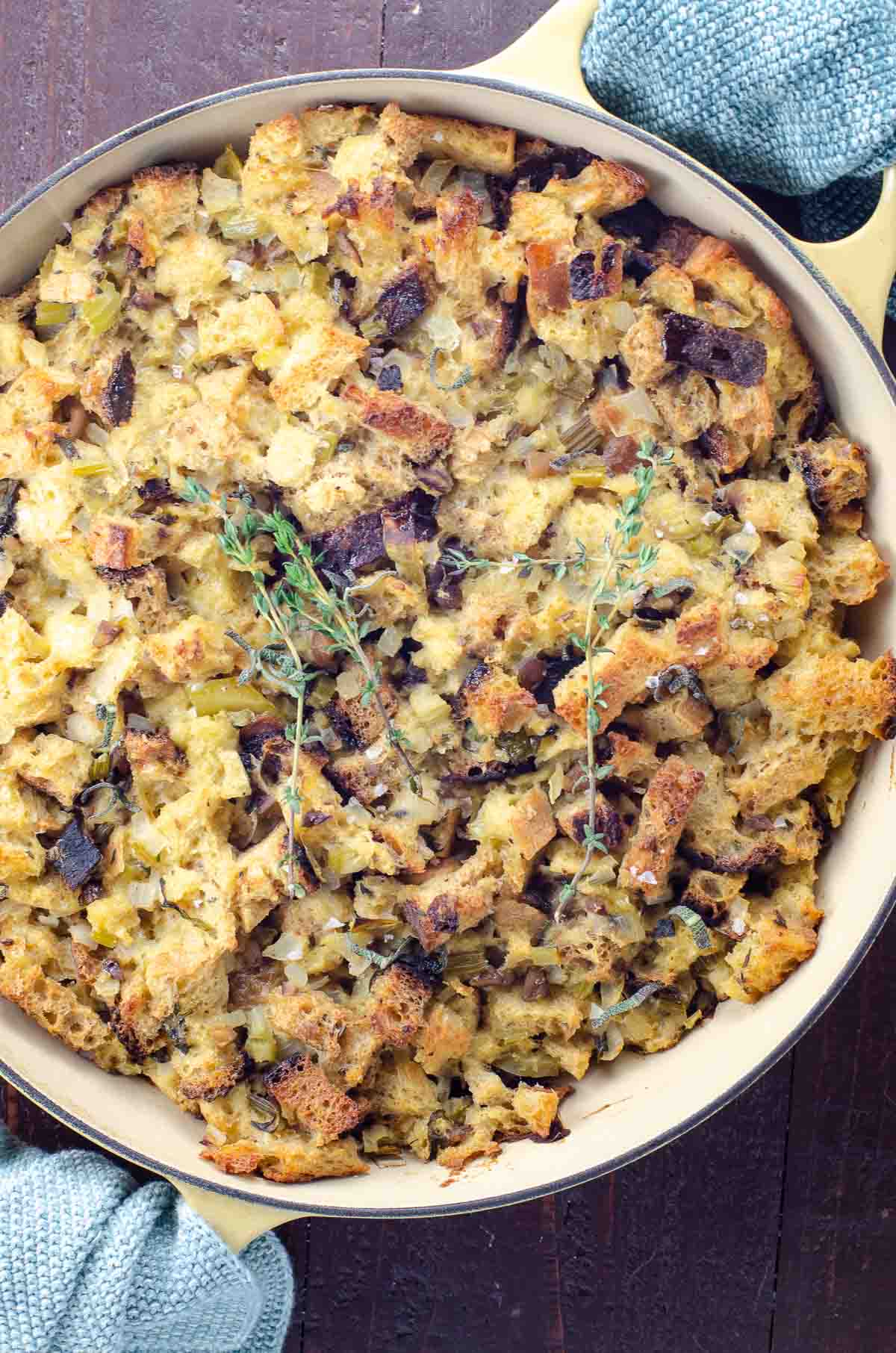
Why we love this recipe
So, here’s my thought on the modern Thanksgiving table. Whether you’re hosting or bringing a contribution to a gathering, you’re very likely to be feeding a crowd with a variety of dietary preferences.
It’s not easy to keep it simple. But one thing you can do is to make everything but the turkey vegetarian.
This wonderful vegetarian stuffing recipe is based on the stuffing I grew up with and never stopped craving — updated tastefully for today’s holidays. It’s:
- Layered with savory seasonal flavors
- A great balance of crisp exterior to soft interior
- Relatively easy to assemble
- Prep-ahead friendly
Vegetarian stuffing goes perfectly with a Thanksgiving turkey, if you’re into that sort of thing. And if not, it’s savory and satisfying on its own.
What you’ll need
Here’s a glance at the ingredients you’ll need to make this recipe.
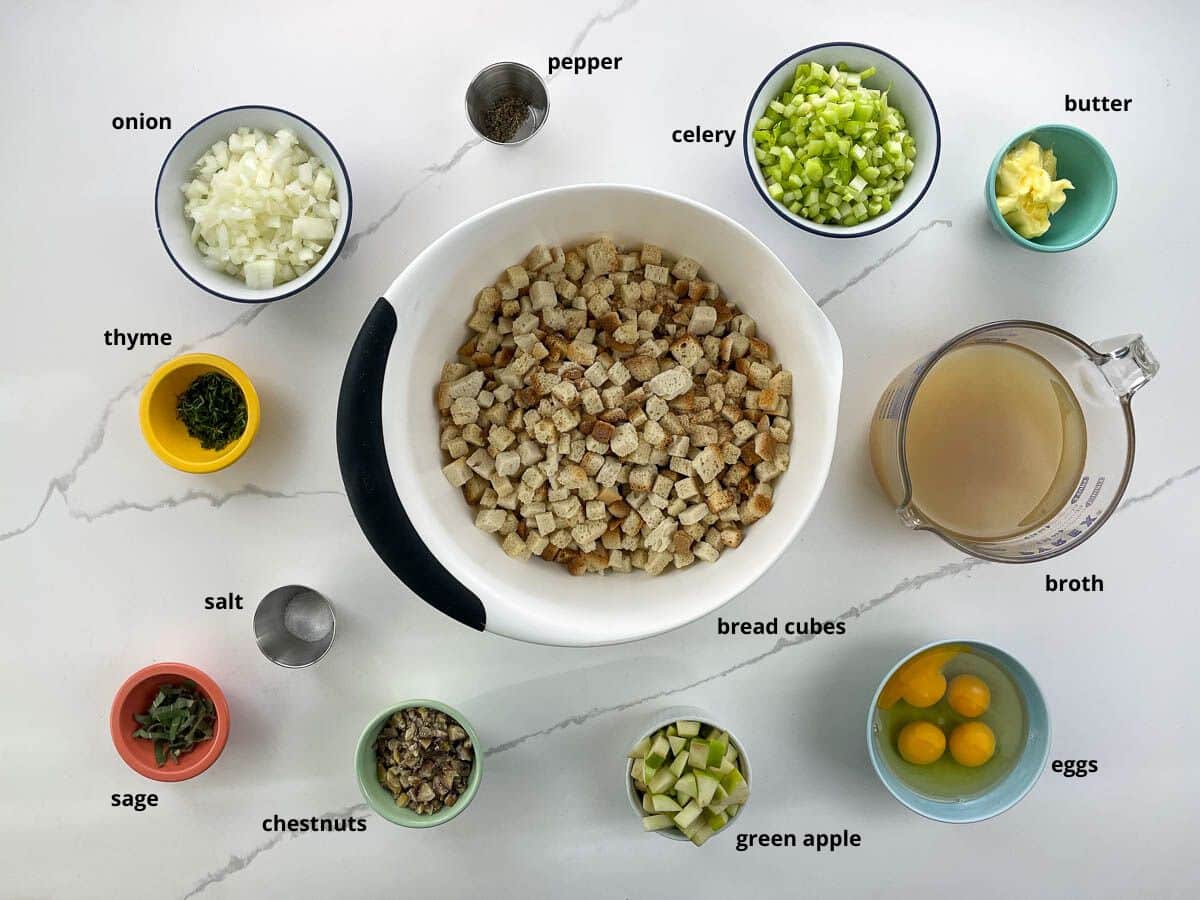
- For this recipe, I like to start with good-quality store-bought dried bread cubes. I typically buy them at Whole Foods, where they’re made from a nice variety of artisan breads. If you’d like to make your own, choose a good crusty bread (or several) that you enjoy, cut into 3/4-inch cubes, and distribute between two rimmed sheet pans without crowding. Bake for about an hour in the center of a 200°F oven, until the cubes are dry all the way through. You can do this up to a few days in advance if you like.
- Cut the onion and celery nice and small so it almost melts into the mix.
- My favorite vegetable broth by far is this one. It makes all the difference.
- I love to use fresh sage and thyme in this recipe, but you can substitute dried if that’s what you’ve got.
- Roasted, shelled chestnuts come in vacuum-sealed packages or jars and tend to be reasonably easy to source during the holiday season — you can find them online if not locally. I find this approach much easier than roasting and shelling them at home.
- Use a nice tart green apple variety like Granny Smith.
- Use a really good-quality butter if you can. Here and virtually everywhere, I start with a cultured, salted butter from grass-fed cows. This sounds fancy but doesn’t have to be. Kerrygold, for example, is sold in most supermarkets at a reasonable price.
How to make it
Here’s an overview of what you’ll do to make a fabulous pan of this classic vegetarian stuffing. You can see the steps in action in the video that accompanies this post, and get all the details in the recipe card below.
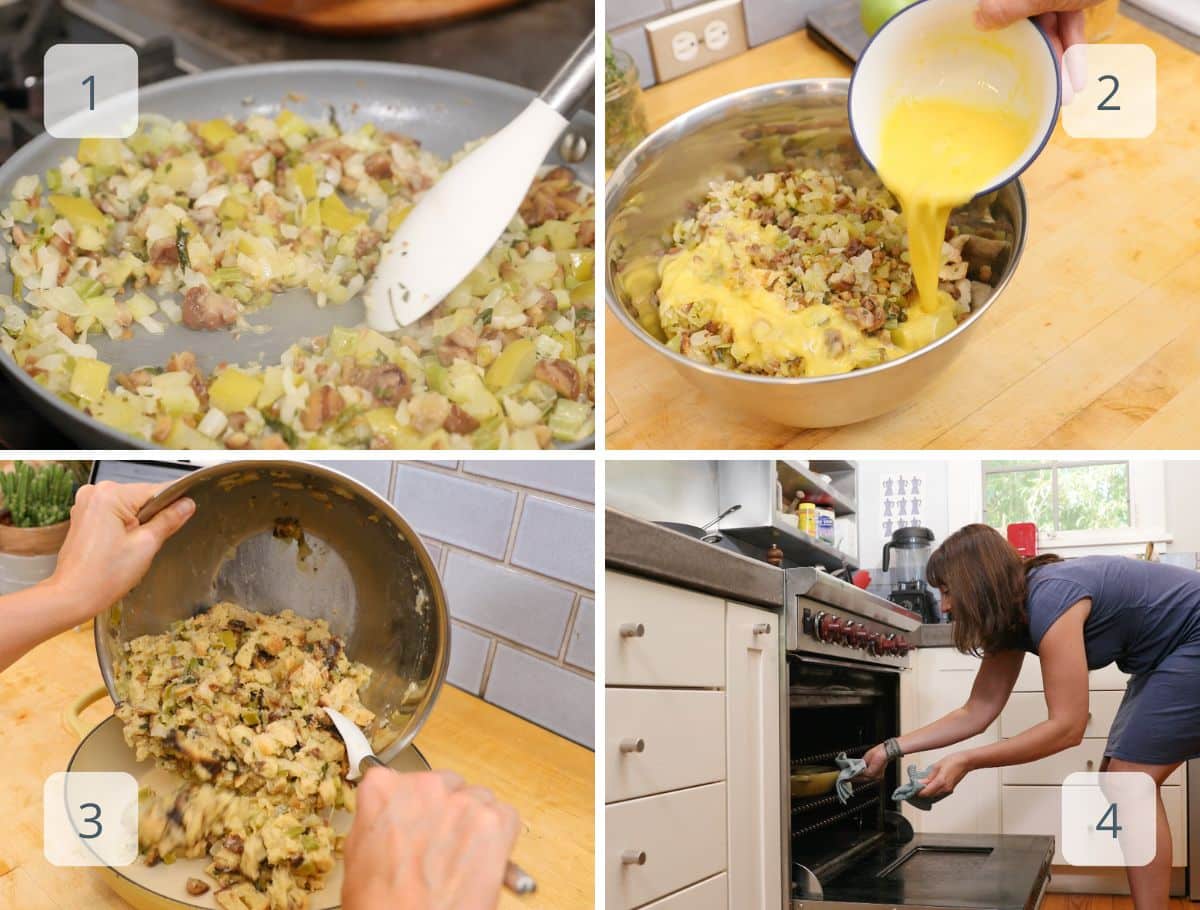
- First you’ll sauté the onion, celery, apple, chestnuts, and herbs in the butter until softened.
- Place the bread cubes and the contents of the skillet into a large mixing bowl. Add the broth and the beaten eggs.
- Mix gently but thoroughly and transfer to a large baking dish.
- Bake until crisp on top and tender and custardy inside. That’s it!
How to make it vegan
If your crowd includes vegans, it’s super-easy (and super-delicious) to turn this stuffing vegan. Simply swap in your favorite mild-flavored olive oil or vegan butter for the butter, and substitute one additional cup of veggie broth for the four beaten eggs. Or try my other favorite vegan stuffing recipe.
How to make it meaty
Are you serving die-hard meat eaters? If you want to go in the other direction entirely, our classic stuffing recipe is also great with sausage. Buy a pound of good-quality sweet Italian or sage-flavored sausage and add it to the frying pan while you’re sautéing the onions and celery.
That’s it! No need to make any other changes.
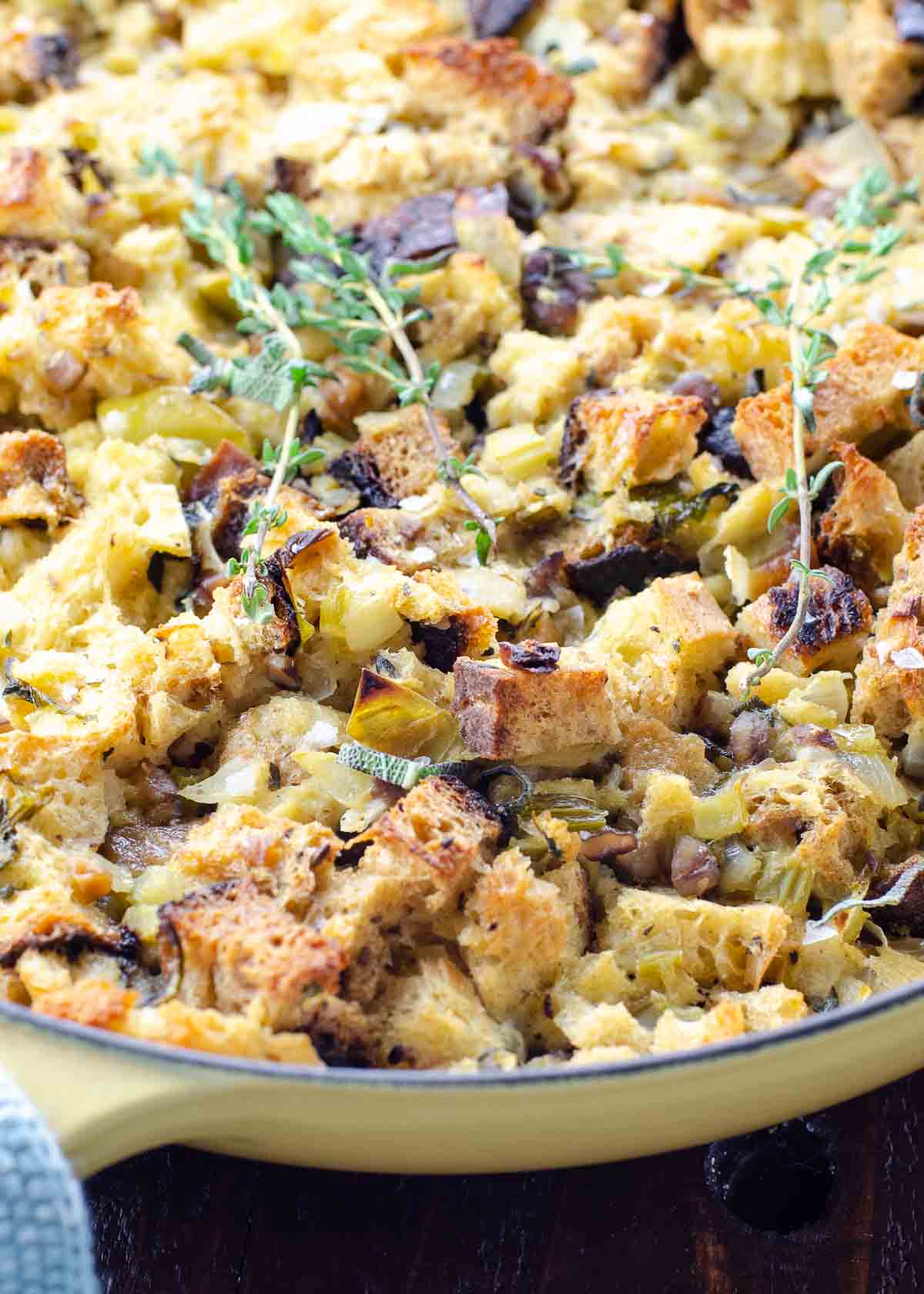
Expert tips and FAQs
Use a nice, wide baking pan or casserole dish to get a great ratio of crisp, golden brown bits to custardy goodness. I like to use a five-quart braiser or an extra-deep 9×13-inch pan.
Sure can! You have two great options here.
The first one, which I prefer, is to assemble the whole pan of stuffing up to 24 hours in advance, but hold off on baking it until just before you’re ready to eat. As long as it’s tightly covered in a nice cold fridge, this is a great approach. You can bake the stuffing straight from the fridge, adding a few extra minutes for it to cook through. Or you can bring it to room temperature on the counter about an hour before baking and pop it in the oven for the 45 minutes indicated in the recipe.
The second option is to bake the stuffing ahead of time and then reheat it before serving. This is totally fine, too. Pull cooked stuffing out of the fridge and let it come to room temperature for an hour or so. Cover your pan tightly and pop it into the oven for 30-40 minutes. Ideally you’d do this at about 375°F, but since Thanksgiving’s ALWAYS got multiple dishes in the oven, you can really reheat it at just about any temperature your oven’s set to.
Leftovers will keep in an airtight container in the fridge for a week.
More vegetarian Thanksgiving essentials
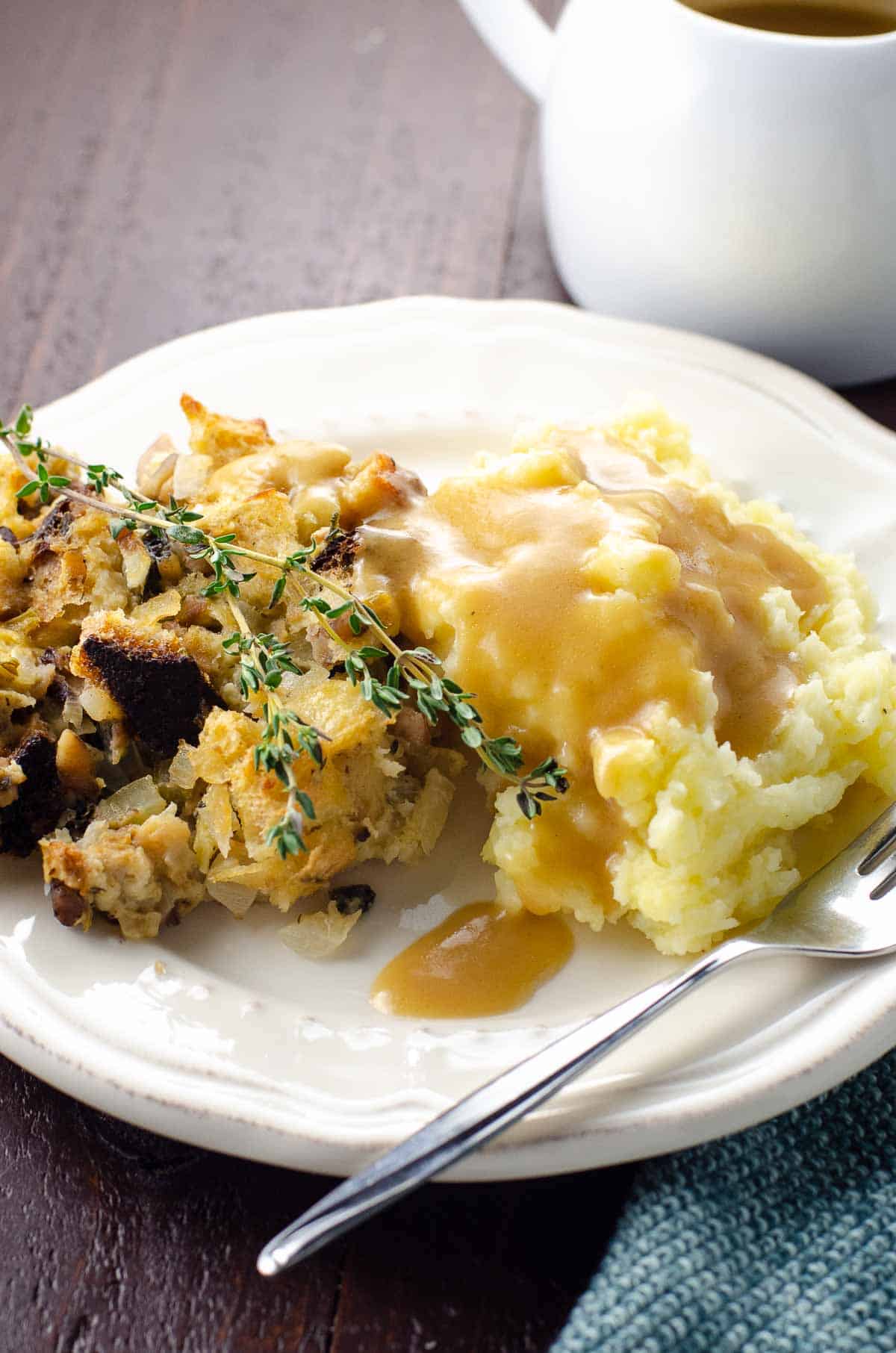
Summarize & Save This Content On
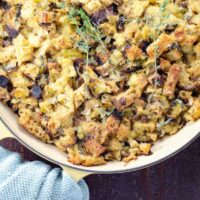
Vegetarian Stuffing Recipe
Equipment
Ingredients
- 4 tablespoons (56 g) butter
- 1 large yellow onion, finely diced
- 3 ribs celery, including leaves, finely diced
- ½ teaspoon fine sea salt, divided
- 1 Granny Smith apple, cored and finely diced
- 1 cup (140 grams) shelled roasted chestnuts, finely chopped
- 2 tablespoons minced fresh thyme, or 2 teaspoons dried
- 2 tablespoons minced fresh sage, or 2 teaspoons dried
- 10 cups (550 grams) dried bread cubes
- 3 cups (710 ml) good vegetable broth, (see note 7 below)
- 4 large eggs, beaten
- ¼ teaspoon freshly ground black pepper
Instructions
- Preheat oven to 375°F with a rack in the center.
- Melt the butter over medium-high heat in a large frying pan.
- Add onion and celery and sprinkle with 1/4 teaspoon of the salt. Cook, stirring occasionally, until beginning to soften and turn translucent, about 5 minutes. Adjust heat as necessary to prevent browning.
- Add apple, chestnuts, thyme, and sage, and continue cooking until apple has softened, about 5 minutes more.
- Place bread cubes into a large mixing bowl and scrape the contents of the frying pan overtop.
- Pour in the broth and the beaten eggs. Sprinkle with remaining 1/4 teaspoon salt and the pepper.
- Mix gently until everything is well-distributed, then let the mixture sit for a few minutes so the bread cubes absorb the wet ingredients.
- Transfer stuffing to a large baking dish such as an extra-deep 9×13-inch pan or a 5-quart braiser.
- Bake uncovered for 45 minutes, until crisp on top and tender and custardy inside.
Notes
- Use a really good-quality butter if you can. Here and virtually everywhere, I start with a cultured, salted butter from grass-fed cows. This sounds fancy but doesn’t have to be. Kerrygold, for example, is sold in most supermarkets at a reasonable price.
- Cut the onion and celery nice and small so it almost melts into the mix.
- Use a nice tart green apple variety like Granny Smith.
- Roasted, shelled chestnuts come in vacuum-sealed packages or jars and tend to be reasonably easy to source during the holiday season — you can find them online if not locally. I find this approach much easier than roasting and shelling them at home.
- I love to use fresh sage and thyme in this recipe, but you can substitute dried if that’s what you’ve got.
- For this recipe, I like to start with good-quality store-bought dried bread cubes. I typically buy them at Whole Foods, where they’re made from a nice variety of artisan breads. If you’d like to make your own, choose a good crusty bread (or several) that you enjoy, cut into 3/4-inch cubes, and distribute between two rimmed sheet pans without crowding. Bake for about an hour in the center of a 200°F oven, until the cubes are dry all the way through. You can do this up to a few days in advance if you like.
- My favorite vegetable broth by far is this one. It makes all the difference. Depending on the type of bread cubes you use, you may need more broth. Some years I find three cups is perfect; other years I use four or even a little more.
- I like to bake this dish at 375°F because it usually shares the oven with popovers right before dinnertime on Thanksgiving. It’s very accommodating, so feel free to let it share an oven that’s set anywhere between 325°F and 400°F. Above 375°F, consider covering it for about half the cooking time.
- You’ve got a couple of good options for prepping this dish ahead of time. The first one, which I prefer, is to assemble the whole pan of stuffing up to 24 hours in advance, but hold off on baking it until just before you’re ready to eat. As long as it’s tightly covered in a nice cold fridge, this is a great approach. You can bake the stuffing straight from the fridge, adding a few extra minutes for it to cook through. Or you can bring it to room temperature on the counter about an hour before baking and pop it in the oven for the 45 minutes indicated in the recipe. The second option is to bake the stuffing ahead of time and then reheat it before serving. This is totally fine, too. Pull cooked stuffing out of the fridge and let it come to room temperature for an hour or so. Cover your pan tightly and pop it into the oven for 30-40 minutes. Ideally you’d do this at about 375°F, but since Thanksgiving’s ALWAYS got multiple dishes in the oven, you can really reheat it at just about any temperature your oven’s set to.
- Leftovers will keep in an airtight container in the fridge for a week.
- To make this stuffing vegan, you can swap in your favorite mild-flavored olive oil or vegan butter for the butter, and replace the eggs with one additional cup of broth.
- To make this stuffing meaty, sauté a pound of sage-flavored (or regular sweet Italian) sausage along with the onions and celery in the first step.
Nutrition
Nutrition information is automatically calculated, so should only be used as an approximation.

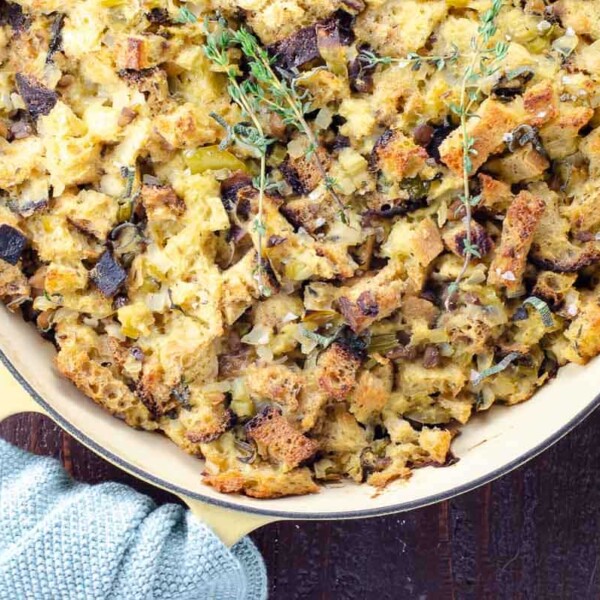
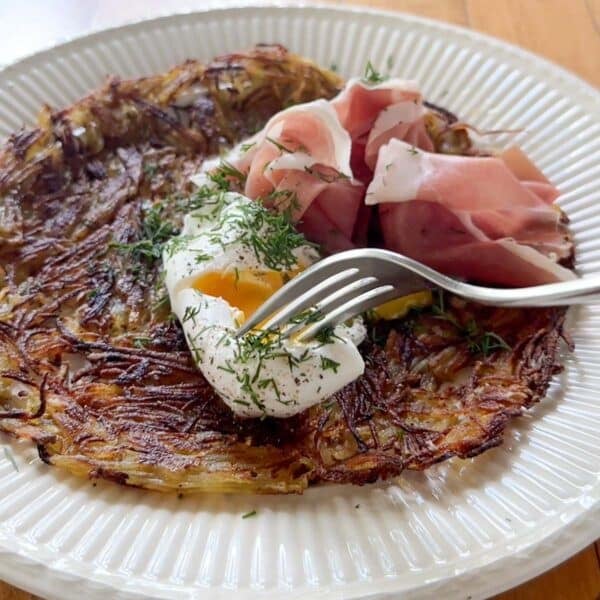
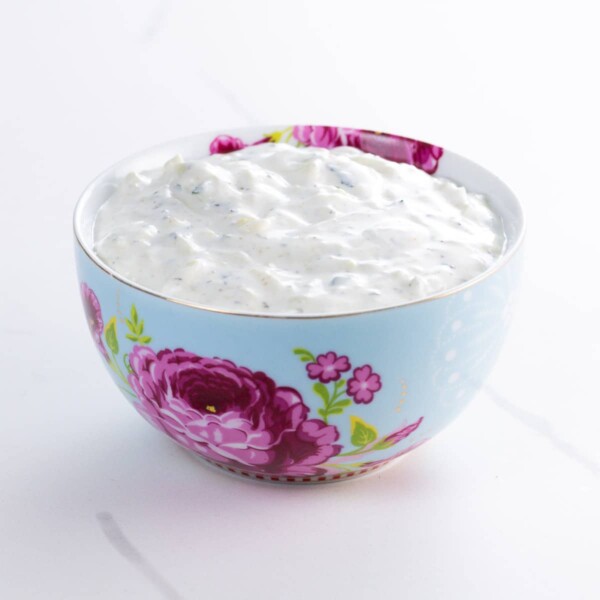
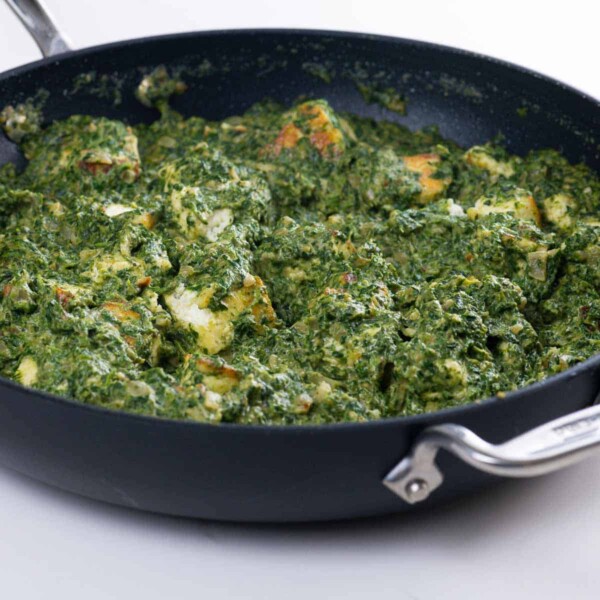
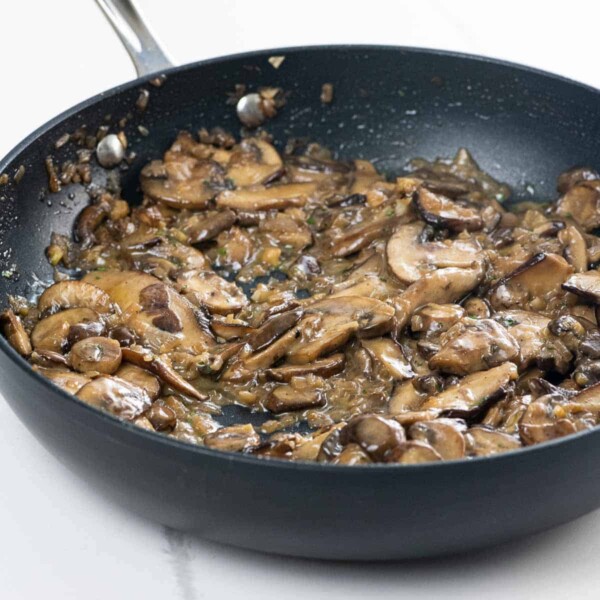
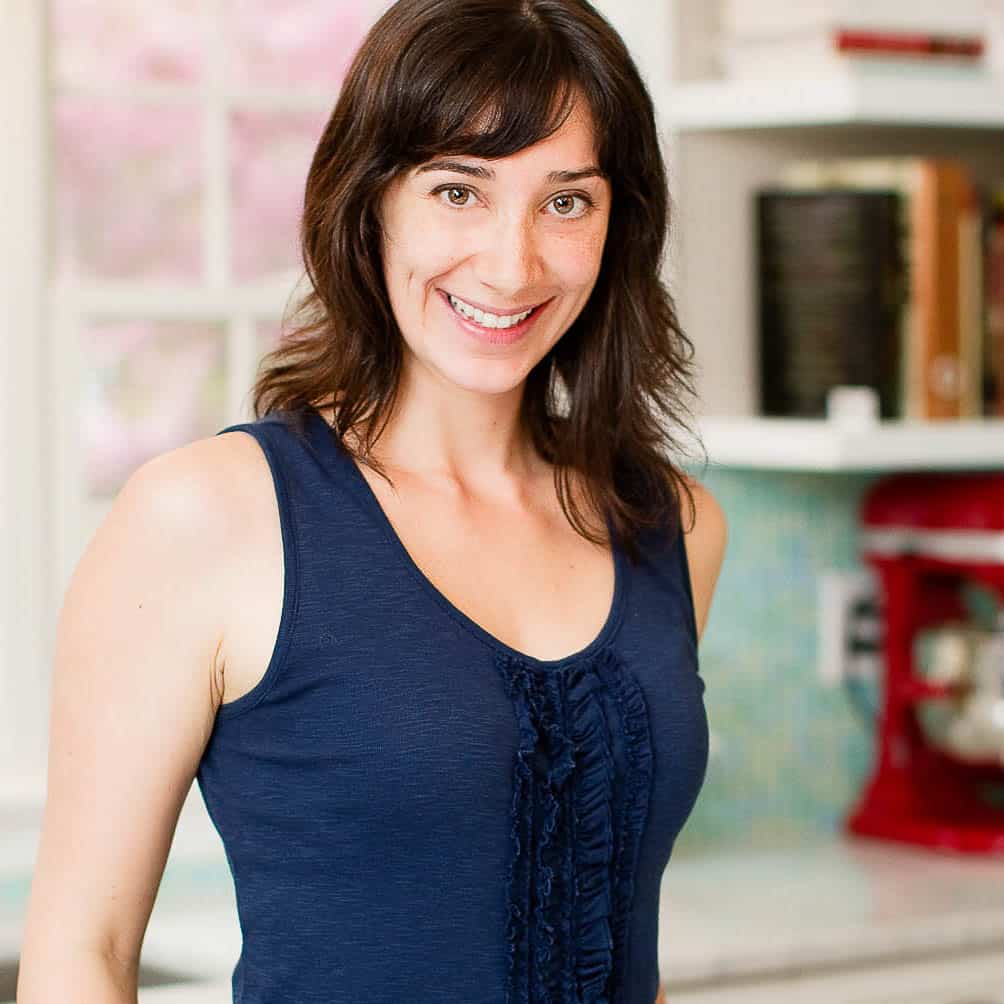






Yum!
I’m making this!! Delicious!
Me too! 🙂
How many servings does this recipe make?
Hi Suzanne, it serves 12.